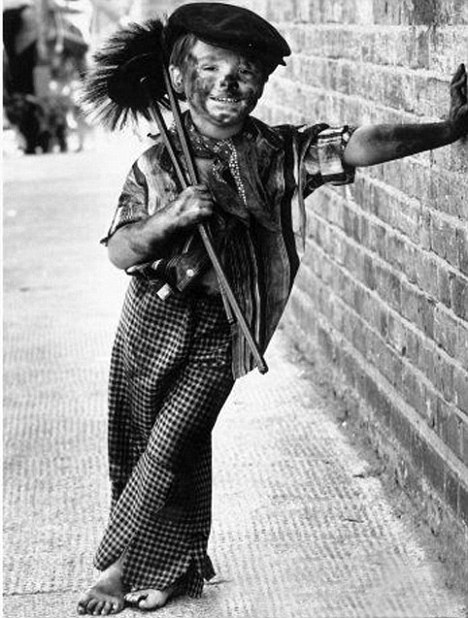
Friday
Having forgotten to have our stovepipe cleaned last summer, we required an emergency intervention recently to avoid a chimney fire. After experiencing an unusual amount of smoke, I learned that creosote had so clogged the flue that only a tiny passage remained.
The good news is that we no longer condemn young boys to death to fix such situations.
I’m not exaggerating. In the 19th century, black lung disease and other ailments kept chimney sweeps from living past their childhood. Although theoretically apprentices, these children were the only apprentices whose parents were paid for their services. Instead of being taught a vocation, in other words, children were essentially sold, with “apprenticeship” functioning as a grotesque euphemism.
We get a grim description of the business from Oliver Twist, where the protagonist barely escapes becoming a sweep. The villainous Mr. Gamfield tries to buy Oliver from the orphanage Board of Directors, who want to rid themselves of the boy for his having asked for more gruel:
‘This here boy, sir, wot the parish wants to ‘prentis,’ said Mr. Gamfield.
‘Ay, my man,’ said the gentleman in the white waistcoat, with a condescending smile. ‘What of him?’
‘If the parish vould like him to learn a right pleasant trade, in a good ‘spectable chimbley-sweepin’ bisness,’ said Mr. Gamfield, ‘I wants a ‘prentis, and I am ready to take him.’
‘Walk in,’ said the gentleman in the white waistcoat. Mr. Gamfield having lingered behind, to give the donkey another blow on the head, and another wrench of the jaw, as a caution not to run away in his absence, followed the gentleman with the white waistcoat into the room where Oliver had first seen him.
‘It’s a nasty trade,’ said Mr. Limbkins, when Gamfield had again stated his wish.
‘Young boys have been smothered in chimneys before now,’ said another gentleman.
‘That’s acause they damped the straw afore they lit it in the chimbley to make ’em come down again,’ said Gamfield; ‘that’s all smoke, and no blaze; vereas smoke ain’t o’ no use at all in making a boy come down, for it only sinds him to sleep, and that’s wot he likes. Boys is wery obstinit, and wery lazy, Gen’l’men, and there’s nothink like a good hot blaze to make ’em come down vith a run. It’s humane too, gen’l’men, acause, even if they’ve stuck in the chimbley, roasting their feet makes ’em struggle to hextricate theirselves.’
It turns out that the Board, rather than displaying humanity, is just trying to bargain Mr. Gamfield down, using his unsavory reputation as leverage. Only the intervention of a magistrate, temporarily rendered humane by seeing Oliver’s terrified expression, saves our hero.
Blake is no less savage than Dickens in describing this reality. His “little black thing among the snow” is so young that he cannot yet pronounce his “s’s,” so calling out his services comes out (appropriately enough) as “weep! weep!”:
A little black thing among the snow,
Crying "weep! 'weep!" in notes of woe!
"Where are thy father and mother? say?"
"They are both gone up to the church to pray.
Because I was happy upon the heath,
And smil'd among the winter's snow,
They clothed me in the clothes of death,
And taught me to sing the notes of woe
And because I am happy and dance and sing,
They think they have done me no injury,
And are gone to praise God and his Priest and King,
Who make up a heaven of our misery."
These pious and patriotic Christians can be seen as the forerunners of Donald Trump’s white evangelical supporters, who are willing to countenance his child separation policies and food stamp cuts for the gratifications he offers them.
On a more positive note, the young men who came to clean our chimney had a wire brush that they attached to a rotator and pushed down the stove pipe. They added extensions as they worked their way down and were careful to wear masks whenever the occasion called for it. They were proud of their work as they explained to me the chemistry of creosote. No fires were lit under them to make sure they worked faster. (Note: I wonder if Mr. Gamfield’s horrific incentives were the origin of that expression.)
One of them noted to me that many stoves still have an unnecessary shelf in the back, which is what sweeps used to stand upon while cleaning. It’s a vestigial leftover from a darker time.
A bad as things are, they used to be worse. Literature played an important role in ending child labor.